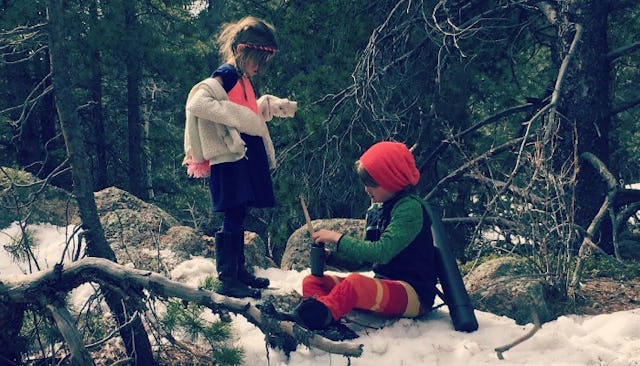Unstructured Play Is The Parenting Miracle We've All Been Hoping For (Really)

Have you ever seen a kid play with a cardboard box? I have. I’ve seen that cardboard box turn into everything from a rocket ship to a baby cradle to a time-out spot for stuffed animals who keep talking back to their mommies. And I might just know where my daughter got that last idea from.
Watching my children play with a cardboard box kinda makes me want to light all of their toys on fire and dance on the ashes and then cancel Christmas forever. They are so much more entertained by their own imaginations than anything I could ever purchase from a store. And, as it turns out, that is a very very good thing.
Why is unstructured play so important?
Child psychologists define unstructured play as, “the kind of play that has no supporting technology, no defined script, and no end goal other than inventing worlds and coming up with ideas.” Enter the cardboard box, or the empty toilet paper tube, or the random wand-shaped stick, or that perfect black pebble that becomes the magic potion that wakes up the dragon who is going to make the whole world lava — and you get the picture.
Scientists often call unstructured play, “Free play,” and they say that it is, in fact, “critical for becoming socially adept, coping with stress and building cognitive skills such as problem solving.” Those are the precisely skills that keep your kids from living in your basement long after graduation, so sign me up.
They just need cardboard boxes and sticks and some paint and blocks, and it turns out, most importantly, boredom.
That’s right, they need to be bored. Dr. Teresa Belton, a psychologist who studied the impact of television and videos on children’s writing, told the BBC that boredom allows children to grow an “internal stimulus” that helps develop their imaginations. They need to be bored to be learn how to be creative. Let’s just all keep this one in our back pocket the next time one of our kids whines about how bored they are. “You’re just improving your mental health, dear.”
Sadly, a study published in the Archives of Pediatrics and Adolescent Medicine journal found that children’s free-play time dropped by a quarter between 1981 and 1997, and “this change appears to be driven by increases in the amount of time children spend in structured activities.”
We are literally scheduling their lives away. We sign them up for soccer and music and karate and Spanish lessons and every other freaking thing because we really think these things are important. I am guilty. We are all guilty. And not only are we scheduling their lives away, they are also spending way too much time on electronics. A study done by the Kaiser Foundation in 2010 that found that children (between the ages of 8 and 18) spend over seven hours on digital media a day. Holy shit.
Not only is free play super important, some scientists have found that the lack of free play can actually be harmful. Psychiatrist Stuart Brown interviewed more than 6,000 people about their childhoods over a span of 50 years. One of his biggest findings was that “a lack of opportunities for unstructured, imaginative play can keep children from growing into happy, well-adjusted adults.” I’m pretty sure he didn’t say anything about the lack of getting the newest video game or most popular toy as keeping children from growing into happy, well-adjusted adults. We can thank him for that.
I think I spent my entire childhood in “unstructured play,” which my parents called “Go outside for Chrissakes!” I remember that in fourth grade our television broke, and we just didn’t get a new one for a couple of years. The excitement when that brand-new set arrived was just about more than I could handle.
But guess what? I also remember sitting down to watch something and thinking, Huh, this is kinda boring, and going outside again to make moss pets and have caterpillar races and play wizards of the forest. My parents didn’t even know they were doing everything completely right by shoving me out the door to play by myself.
I want the same things for my kids. They need to be bored to cultivate their creativity, they need to have less strenuous schedules, and they need for me to step away from them so that their brains can do what they are meant to do: play.
This article was originally published on